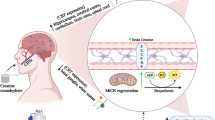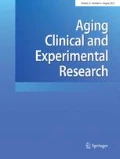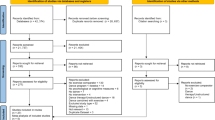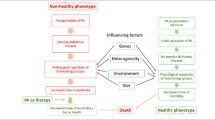Abstract
Objective
To compare the efficacy of different types of exercises on global cognition in adults with mild cognitive impairment.
Methods
We systematically searched six databases from their inception to December 14, 2018, for randomized controlled trials evaluating the efficacy of exercise on global cognition in adults with mild cognitive impairment. For the included studies, the mean changes in global cognition from baseline to endpoint were analyzed. A random-effects model was used to conduct pairwise meta-analyses to directly examine the efficacy of different types of exercises. The consistency model was used to conduct a network meta-analysis to evaluate the relative efficacy and rank probability of different types of exercises.
Results
Pairwise meta-analyses suggested that there was no significant heterogeneity in the exercises. Aerobic exercises (n = 5), resistance exercises (n = 4), and mind–body exercises (n = 7) all had significant benefits compared to the control. Exergame showed a positive trend for higher efficacy than control (n = 1) and mind–body exercise (n = 1). The results of the network meta-analysis indicated that the four exercise types all had significant benefits compared to the control, and resistance exercises outperformed mind–body exercises. Resistance exercises were most likely to be ranked 1, followed by exergames, aerobic exercises, and mind–body exercises.
Conclusions
High-intensity and frequent resistance exercises may be the most effective exercise type to improve global cognition in adults with mild cognitive impairment. More multi-arm designs and randomized controlled trials examining the efficacy of exergames are needed.



Similar content being viewed by others

References
Petersen RC, Caracciolo B, Brayne C et al (2014) Mild cognitive impairment: a concept in evolution. J Intern Med 275:214–228
American Psychiatric Association (2013) Diagnostic and statistical manual of mental disorders. American Psychiatric Association, Washington, DC
Hu C, Yu D, Sun X et al (2017) The prevalence and progression of mild cognitive impairment among clinic and community populations: a systematic review and meta-analysis. Int Psychogeriatr 29:1595–1608
Petersen RC, Doody R, Kurz A et al (2001) Current concepts in mild cognitive impairment. Arch Neurol 58:1985–1992
Prince M, Wimo A, Guerchet M et al (2015) World Alzheimer Report 2015—the global impact of dementia: an analysis of prevalence, incidence, cost and trends. Alzheimer's Disease International, London
Kelley AS, McGarry K, Gorges R et al (2015) The burden of health care costs for patients with dementia in the last 5 years of life. Ann Intern Med 163:729–736
Rodakowski J, Saghafi E, Butters MA et al (2015) Non-pharmacological interventions for adults with mild cognitive impairment and early stage dementia: an updated scoping review. Mol Asp Med 43–44:38–53
Choi W, Lee S (2018) Ground kayak paddling exercise improves postural balance, muscle performance, and cognitive function in older adults with mild cognitive impairment: a randomized controlled trial. Med Sci Monit Int Med J Exp Clin Res 24:3909–3915
Hong SG, Kim JH, Jun TW (2018) Effects of 12-week resistance exercise on electroencephalogram patterns and cognitive function in the elderly with mild cognitive impairment: a randomized controlled trial. Clin J Sport Med Off J Can Acad Sport Med 28:500–508
Doi T, Verghese J, Makizako H et al (2017) Effects of cognitive leisure activity on cognition in mild cognitive impairment: results of a randomized controlled trial. J Am Med Dir Assoc 18:686–691
Hughes TF, Flatt JD, Fu B et al (2014) Interactive video gaming compared with health education in older adults with mild cognitive impairment: a feasibility study. Int J Geriatr Psychiatry 29:890–898
Song D, Yu DSF, Li PWC et al (2018) The effectiveness of physical exercise on cognitive and psychological outcomes in individuals with mild cognitive impairment: a systematic review and meta-analysis. Int J Nurs Stud 79:155–164
Zheng G, Xia R, Zhou W et al (2016) Aerobic exercise ameliorates cognitive function in older adults with mild cognitive impairment: a systematic review and meta-analysis of randomised controlled trials. Br J Sports Med 50:1443–1450
Nagamatsu LS, Handy TC, Hsu CL et al (2012) Resistance training promotes cognitive and functional brain plasticity in seniors with probable mild cognitive impairment. Arch Intern Med 172:666–668
Higgins J (2011) Cochrane handbook for systematic reviews of interventions. The Cochrane Collaboration, London
Cohen J (1988) Statistical power analysis for the behavioral sciences. L. Erlbaum Associates, Mahwah
Higgins JP, Thompson SG, Deeks JJ et al (2003) Measuring inconsistency in meta-analyses. BMJ 327:557–560
Chen H, Manning AK, Dupuis J (2012) A method of moments estimator for random effect multivariate meta-analysis. Biometrics 68:1278–1284
Liang W, Wu X, Fang W et al (2014) Network meta-analysis of erlotinib, gefitinib, afatinib and icotinib in patients with advanced non-small-cell lung cancer harboring EGFR mutations. PLoS One 9:e85245
Lautenschlager NT, Cox KL, Flicker L et al (2008) Effect of physical activity on cognitive function in older adults at risk for Alzheimer disease: a randomized trial. JAMA 300:1027–1037
Varela S, Ayán C, Cancela JM et al (2012) Effects of two different intensities of aerobic exercise on elderly people with mild cognitive impairment: a randomized pilot study. Clin Rehabilit 26:442
Kohanpour MA, Peeri M, Azarbayjani MA (2017) The effects of aerobic exercise with lavender essence use on cognitive state and serum brain-derived neurotrophic factor levels in elderly with mild cognitive impairment. Br J Pharmacol 6:80–84
Wei XH, Ji LL (2014) Effect of handball training on cognitive ability in elderly with mild cognitive impairment. Neurosci Lett 566:98–101
Lu J, Sun M, Liang L et al (2016) Effects of momentum-based dumbbell training on cognitive function in older adults with mild cognitive impairment: a pilot randomized controlled trial. Clin Interv Aging 11:9–16
Fiatarone Singh MA, Gates N, Saigal N et al (2014) The study of mental and resistance training (SMART) study-resistance training and/or cognitive training in mild cognitive impairment: a randomized, double-blind, double-sham controlled trial. J Am Med Dir Assoc 15:873–880
Yoon DH, Kang D, Kim HJ et al (2017) Effect of elastic band-based high-speed power training on cognitive function, physical performance and muscle strength in older women with mild cognitive impairment. Geriatr Gerontol Int 17:765–772
Lam LC, Chau RC, Wong BM et al (2012) A 1-year randomized controlled trial comparing mind body exercise (Tai Chi) with stretching and toning exercise on cognitive function in older Chinese adults at risk of cognitive decline. J Am Med Dir Assoc 13:568.e515–568.e520
Lazarou I, Parastatidis T, Tsolaki A et al (2017) International ballroom dancing against neurodegeneration: a randomized controlled trial in greek community-dwelling elders with mild cognitive impairment. Am J Alzheimers Dis Other Dement 32:489–499
Qi M, Zhu Y, Zhang L et al (2019) The effect of aerobic dance intervention on brain spontaneous activity in older adults with mild cognitive impairment: a resting-state functional MRI study. Exp Ther Med 17:715–722
Zhu Y, Wu H, Qi M et al (2018) Effects of a specially designed aerobic dance routine on mild cognitive impairment. Clin Interv Aging 13:1691–1700
Cai J, Zhang ZX (2018) The effect of continuous fitness qigong exercise on mild cognitive impairment in the elderly. J Baicheng Norm Univ 32:59–63
Liu T, Guo SQ, Bai S (2018) Effect of baduanjin on cognition in patients with mild cognitive impairment. Chin J Rehabilit Theory Pract 24:854–859
Greblo Jurakic Z, Krizanic V, Sarabon N et al (2017) Effects of feedback-based balance and core resistance training vs. Pilates training on cognitive functions in older women with mild cognitive impairment: a pilot randomized controlled trial. Aging Clin Exp Res 29:1295–1298
Voss MW, Nagamatsu LS, Liu-Ambrose T et al (2011) Exercise, brain, and cognition across the life span. J Appl Physiol 111:1505–1513
Mavros Y, Gates N, Wilson GC et al (2017) Mediation of cognitive function improvements by strength gains after resistance training in older adults with mild cognitive impairment: outcomes of the study of mental and resistance training. J Am Geriatr Soc 65:550–559
Nourhashemi F, Andrieu S, Gillette-Guyonnet S et al (2002) Is there a relationship between fat-free soft tissue mass and low cognitive function? Results from a study of 7,105 women. J Am Geriatr Soc 50:1796–1801
Burns JM, Johnson DK, Watts A et al (2010) Reduced lean mass in early Alzheimer disease and its association with brain atrophy. Arch Neurol 67:428–433
Anderson JG, Rogers CE, Bossen A et al (2017) Mind-body therapies in individuals with dementia: an integrative review. Res Gerontol Nurs 10:288–296
Wayne PM, Walsh JN, Taylor-Piliae RE et al (2014) The impact of tai chi on cognitive performance in older adults: a systematic review and meta-analysis. J Am Geriatr Soc 62:25–39
Stanmore E, Stubbs B, Vancampfort D et al (2017) The effect of active video games on cognitive functioning in clinical and non-clinical populations: a meta-analysis of randomized controlled trials. Neurosci Biobehav Rev 78:34–43
Author information
Authors and Affiliations
Corresponding authors
Ethics declarations
Conflict of interest
The authors declare that they have no conflicts of interest.
Statement of human and animal rights
This article does not contain any studies with human participants performed by any of the authors.
Informed consent
For this type of studies, formal consent is not required.
Additional information
Publisher’s Note
Springer Nature remains neutral with regard to jurisdictional claims in published maps and institutional affiliations.
Electronic supplementary material
Below is the link to the electronic supplementary material.
Rights and permissions
About this article
Cite this article
Wang, S., Yin, H., Wang, X. et al. Efficacy of different types of exercises on global cognition in adults with mild cognitive impairment: a network meta-analysis. Aging Clin Exp Res 31, 1391–1400 (2019). https://doi.org/10.1007/s40520-019-01142-5
Received:
Accepted:
Published:
Issue Date:
DOI: https://doi.org/10.1007/s40520-019-01142-5



